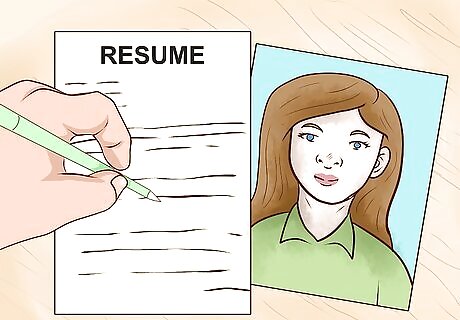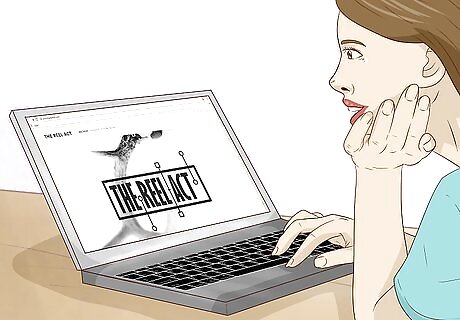
views
Developing Your Skills

Join a theater group while you are in middle school or high school. If you are still in school, join the drama club. Look for announcements regarding drama club meetings, or ask your guidance counselor to help you connect with the correct faculty member to get you started. Then, attend all meetings and practices. This is a great way to learn fundamental acting skills and participate in your first plays or musicals. In drama club, you can learn things like different methods of acting, writing your own material, trying out different characters, and stage/costume design. In addition, consider majoring in theater or acting in college to continue your education.

Take an acting class or workshop outside of school. Look for small playhouses and theaters in your area, and research any workshops, classes, or training courses. Most communities have a local theater in the area, and many native actors offer ways to gain acting skills, such as summer workshops, personal lessons, or networking events. Make a selection based on what you want to learn, and sign up for the class online or in person. This is a great idea if you want to take up acting but did not join a drama club in school. Improvisation classes are a good place to start. Improvisational acting trains you to pay attention to cues and respond quickly. You'll learn to naturally react to others' prompts and silence your inner critic. When you advance past basic acting classes, you can take specialized classes for film or stage acting, which require different skills. Experiment with both to figure out which suits you best.

Research famous actors and read plays and acting books. Acting has its own rich history, language, and terminology. To familiarize with the acting world, read history books and articles on acting, and look over the biographies of famous actors. In addition, read plays as a way to keep your passion going. For example, familiarize yourself with the Shakespeare classics and the Globe Theater.

People-watch to learn about different expressions and behaviors. A great way to expand your acting knowledge is to observe the people in your daily life. Take a second to watch others while at a coffee shop, restaurant, or running errands. Quickly watch others to get a sense of their mannerisms, facial expressions, and body language. Then, use this knowledge when acting to deliver an authentic performance. For example, you can watch a young child with a large ice cream cone. Pay attention to how their happiness is expressed across their face. Then, use these facial expressions when you act out a happy scene. Be careful not to stare or gawk at the person, as this will make them uncomfortable. Meryl Streep Meryl Streep, Actor Genuine curiosity in others grounds your performance. "I'm curious about other people. That's the essence of my acting. I'm interested in what it would be like to be you."
Preparing for an Audition

Get professional headshots taken to use when applying to roles. A headshot is a photograph from the bust up used to help actors get auditions. Actors submit these along with their resume when applying to a certain position. Find a professional photographer, review their work, and explain that this is an acting headshot. When it’s time to take your picture, dress in neutral clothes and try a few different angles and poses. Typically, headshots are printed on standard 8.5 in × 11 in (22 cm × 28 cm) paper. Use the same size of paper for your resume. It looks more professional this way. In addition, get electronic copies of your headshots. Some agencies may ask you to email your resume and headshots. You want a professional, presentable photograph that displays your natural beauty.

Draft your resume to hand out with your headshots. When applying to auditions, you must submit a resume along with your headshots. Start your resume with your name, address, and contact information. Then, list your educational experiences, work experiences, and overall skills. Be sure to highlight any acting classes and workshops, and list all of the acting roles you’ve performed. If you’ve received any acting awards, list them as well. Adjust your resume for the particular jobs you want. For example, if you want a lead acting role, show all of your strengths supporting why you should be the lead role.

Use acting websites to help find gigs and get your name out there. There are websites available to host your professional acting information, such as your headshot and resume. Try sites such as ReelAct.com, and create a profile to get started. Then, upload your documents, and browse work in your area. To apply for a particular audition, click the “Apply now” link (or something similar). To view the ReelAct website, visit http://www.thereelact.com/.

Sign up to be a movie extra as a way to get your feet wet. If you aren’t quite ready for an audition but want to get some acting experience, search online for local movie extra auditions. These are listed on large casting sites such as Backstage, or local advertising sites such as Craigslist. Search for extra roles based on your location, and send your resume and headshot to apply. There are paid and volunteer movie extra positions. When you are first gaining experience, take any opportunity you can get! For instance, visit https://www.backstage.com/.

Network with other actors, agents, and professionals to find auditions. As you expand your acting career, you will meet many other actors, actresses, directors, set designers, and the list goes on. A great actress stays up-to-date with their network and what’s happening around them. This way, you can easily get involved and find new roles to audition for! For example, add all of your acting acquaintances on social media. Then, keep an eye on any upcoming casting calls or open auditions.
Getting the Part

Research the role so you understand the character and plot. Before the audition, research the particular character or role as much as you can. Read books or search online. This will help you get into character even before you start practicing lines. For example, if you are trying out for Desdemona's role in Othello, look up who she was, what she did in the play, and the historical significance of her character.

Memorize your lines for the part you are auditioning for. Start memorizing your part as far in advance as you can. Memorize your lines or lyrics exactly as you will be performing them in the audition. Practice your lines over and over until you know it by heart. If you are unfamiliar with a word, look it up and familiarize yourself. If a part is particularly tricky, give yourself extra time to perfect it.

Practice sight reading so you are prepared for anything. Sight reading, or “cold reading,” is when you read material with little or no time to prepare in advance. During most acting auditions, you’ll be asked to cold read a piece, as well as deliver your own monologue. Practice auditioning with unfamiliar work to become comfortable with sight reading during your audition. For example, find an unfamiliar play and practice acting out loud.

Dress comfortably yet professionally in neutral, flattering clothing. Wear something you will feel comfortable and confident in. However, don’t pick clothing that grabs lots of attention. Avoid dressing in costume since you’ll be styled to fit the part after you get it. You want to look professional and neutral so you can fit any role. Avoid wearing bulky jewelry or choosing loose clothing. Wear shoes that are closed-toed, lightweight, and comfortable, like flats or sneakers. Do not wear flip-flops, as they look unprofessional.

Arrive at your audition early and be prepared when you get there. Before the audition, review the audition notice to make sure you know the audition guidelines. Then, show up to your audition at least 15 minutes early to show your initiative and time management. When you arrive, check in at the front desk, introduce yourself and the part you are auditioning for, and be ready to audition at any time. You never know the schedule the casting director is working with. Be prepared to answer questions about yourself and your schedule. For instance, the director may want to know what other roles you performed in or if you have specific training. They also may ask questions regarding how often you can practice and if you have any schedule disruptions. Expect to audition with the casting director, a cameraman, and a reader. There may be directors, producers, and associates in the room with you. Be prepared to audition in front of any number of people.

Act and speak with confidence in yourself. You’ve practiced the part, you’ve done the research, now it is time to show them what you can do! Act confidently as you arrive at the audition, and do the best you can. Speak with a self-assured tone when you introduce yourself and when you audition with the director. Remember, there will always be more auditions. If you don’t nail this one, it doesn't mean you aren’t a good actress.

Improvise if you forget your lines during the audition. Fake your lines if you forget them to show the director that you are flexible and adaptable. The director may not even notice. If they do, they likely will appreciate your creativity and ability to keep your performance going even under stress.

Be patient when waiting for a decision. In some cases, you'll hear a decision right away. However, directors live busy lives, so you could receive a call back in a few weeks or months. Don't worry if you don't get a call back immediately! It may take a bit before you hear a decision one way or another. It is not common to contact the director or casting agent about the status of your audition. They will contact you or your agent when they have reached a decision. Remember, just because you didn't make the part doesn't mean you can't be an actress. Keep practicing, try a new class, and look for different roles!

Hire an agent to help you when you feel confident in your abilities. If you want to take your acting to the next level after you’ve acted in several parts, it is time to find an agent. These are professional networkers who keep up-to-date with upcoming performances and casting calls. To find an agent, search online or ask your network for recommendations. Then, agree on a set rate and draft a contract to reference in the future. A good talent agent is someone trustworthy, honest, and helpful.



















Comments
0 comment